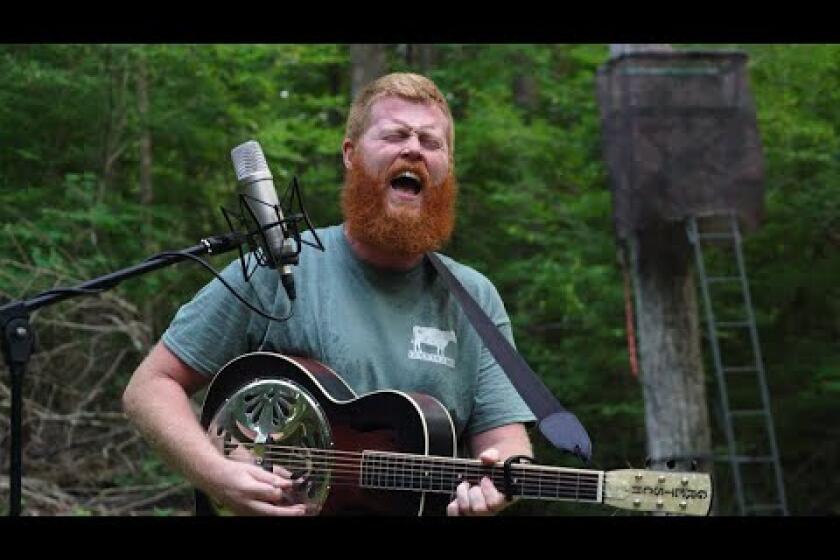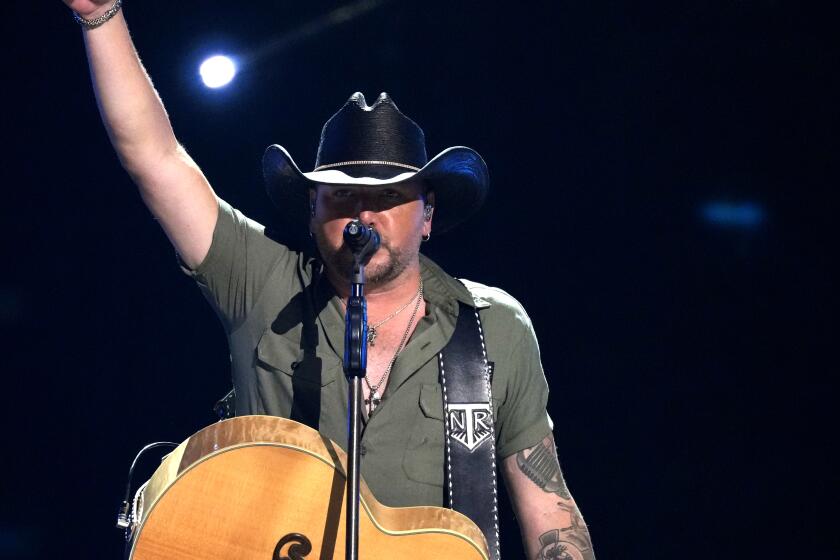How right-wing-endorsed country sensation Oliver Anthony scored a left-field No. 1 hit

In a week and a half, Oliver Anthony became a rich man south of Richmond.
Essentially unknown as recently as early August, the red-bearded singer and songwriter from central Virginia burst into notoriety 10 days ago when his song “Rich Men North of Richmond” — a rough-hewn account of working-class desperation aimed at Washington bureaucrats bent on “total control” — went viral overnight thanks in part to its hearty embrace by an array of right-wing pundits and politicians.
First, the song topped the iTunes chart — one indication of the passion it had stirred among listeners still willing to pay to download a piece of music. Then it topped Spotify’s U.S. Top 50, a far more accurate gauge of widespread popularity in the streaming age. On Monday, Billboard reported that “Rich Men North of Richmond” — accompanied by a no-frills music video shot live in the woods that’s racked up more than 29 million views on YouTube — had entered the Hot 100 at No. 1, replacing Morgan Wallen’s smash “Last Night” atop the music industry’s flagship singles chart.
The achievement caps a stretch in which this self-described factory worker turned farmer, who’s in his early 30s and who’s admitted to struggles with substance abuse, was raking in an estimated $40,000 a day from sales and streams of his music, according to the trade journal Hits.
Anthony’s success comes amid a hot summer on the charts for country music. Behind “Rich Men” on the Hot 100 this week are two more country hits, in Luke Combs’ cover of Tracy Chapman’s late-1980s “Fast Car” and Wallen’s “Last Night” (which itself has logged 16 nonconsecutive weeks at No. 1) — just the second time in Billboard history, following the first last month, that country tunes have taken the tally’s top three spots.
As Oliver Anthony’s ‘Rich Men North of Richmond’ tops country music charts, its politically charged lyrics have become a hot topic in the culture war.
But this isn’t merely a story about the growing appeal of the country genre, which the tracking service Luminate says logged its biggest streaming week ever in June with 2.26 billion plays on platforms like Spotify and Apple Music. According to Billboard, consumption of country music overall is up more than 20% in 2023 as compared to the first half of 2022.
At the beginning of a presidential race in which the right is on the hunt for MAGA warriors in pop culture, there’s also a complicated political aspect to the rise of “Rich Men,” just as there was with another country hit that recently went to No. 1, Jason Aldean’s “Try That in a Small Town.” In that case, the veteran Nashville star’s song — a threat of vigilante justice directed toward anyone who dares to bring inner-city lawlessness to a place “full of good old boys raised up right” — became a conservative rallying cry after CMT banned its music video, which was shot at a Tennessee courthouse once used for a lynching.
Soon, the likes of Fox News host Jesse Watters and Florida Gov. Ron DeSantis were expressing their support, turning “Try That in a Small Town” into a symbol of the left’s supposed cancel-culture overreach and propelling Aldean toward his first appearance atop the Hot 100.
“Rich Men North of Richmond” is a very different song — more plaintive than confrontational, more stripped-down than bulked-up. And of course the out-of-nowhere Anthony is a different figure than the established Aldean, who’d been inching toward full-on MAGA-dom for years before “Try That in a Small Town,” including in a well-publicized feud with Maren Morris over gender-affirming healthcare that embodied Nashville’s broader culture war regarding diversity and inclusion.
As much of Nashville’s music community condemned the track, prominent Republican presidential candidates rushed in to support it.
Yet Anthony’s song is similarly naive in its political calculation: Where Aldean paints a hysterical portrait of urban chaos, Anthony muddies his critique of government malfeasance by complaining about obese people “milking welfare” to buy “bags of Fudge Rounds,” as though food stamps are the reason he’s been working “overtime hours for bulls— pay.” Even the National Review and Christianity Today dinged Anthony for his childish and mean-spirited thinking, with its tired echoes of Ronald Reagan’s blame-the-poor rhetoric.
But Anthony — who said in a YouTube video that he sits “pretty dead center down the aisle on politics” — drew enthusiastic praise from across the conservative commentariat: Republican congresswoman Marjorie Taylor Greene called “Rich Men North of Richmond” the “anthem of the forgotten Americans,” while Kari Lake, the failed Arizona gubernatorial candidate, said she couldn’t listen to the song “without getting chills.”
Hard-right influencer Matt Walsh crystallized a widely espoused view when he credited the song’s ascent to its “raw and authentic” quality at a moment when “everything around us is fake” — a boring trope, to be sure, though not one any more tedious than the insistence of some on the left that “Rich Men’s” virality could only have been the result of some nefarious astroturfing plot. (In popular music, gaming the system to build an audience goes without saying.)
Implicit in progressives’ suspicion of Anthony’s success is the certainty that he and his song are nothing special. But there’s a live-wire intensity to his ragged delivery in “Rich Men North of Richmond” that — beyond suggesting he’s been paying close attention to Zach Bryan and Tyler Childers, to name two left-leaning Americana acts — sells his claim that he’s “living in the new world with an old soul.” When I asked one top Nashville record producer whether he’d be interested in working with Anthony, he responded: “He’s a good singer, not sure he needs a producer, maybe just a good microphone.”
Indeed, one thing “Rich Men” has demonstrated is that country music, having long since absorbed hip-hop’s sound and attitude (as heard in songs like Wallen’s “Last Night” if definitely not in “Rich Men” itself), has finally absorbed its scrappy methodology as well: Think of Oliver and his viral hit as a rural spin on what Lil Nas X accomplished a few years ago when he harnessed social media to create a DIY smash with “Old Town Road.”
Might Anthony go on to align himself with country music’s power structure as Lil Nas X did in pop and rap? In a Facebook post last week, Anthony wrote that he has no interest in becoming a traditional superstar — that “people in the music industry give me blank stares when I brush off 8 million dollar offers.”
Asked whether he thought those offers were legit, a prominent Nashville manager told me, “I doubt that very much.” One label head said a record deal that high “wouldn’t be where the market has been right now” and that perhaps Anthony was referring to an offer from a concert promoter. Over the weekend, the singer played a show at a golf club in North Carolina — not exactly a blue-collar oasis by the looks of it — that attracted between 6,000 and 8,000 people, according to Billboard; the label exec told me he could see Anthony “easily” filling 2,500-seat venues were he to hit the road tomorrow. (Anthony didn’t respond to an interview request.)
Historically, true superstardom in country music has required the support of slow-moving terrestrial radio, which for Anthony has yet to materialize in any meaningful way. But some chart analysts have already predicted that, based on its continued strength at streaming, “Rich Men North of Richmond” will maintain its spot atop the Hot 100 for a second week — something Aldean couldn’t do with “Try That in a Small Town” with more than a decade of country-radio hits behind him.
At a certain point, programmers will likely feel they have no choice but to play what listeners want to hear, which means that fame — and a sudden role in American politics — may be coming for Anthony whether he wants it or not.
More to Read
The biggest entertainment stories
Get our big stories about Hollywood, film, television, music, arts, culture and more right in your inbox as soon as they publish.
You may occasionally receive promotional content from the Los Angeles Times.













